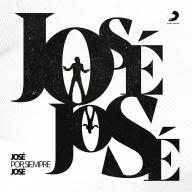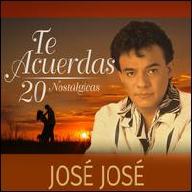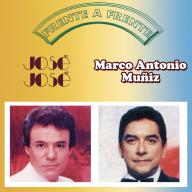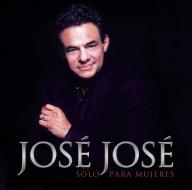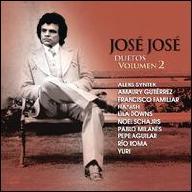Born José Romulo Sosa Ortíz in Mexico City, his father, José Sosa Esquivel, was an operatic tenor and his mother, Margarita Ortiz, was a classical pianist. Jose learned guitar in his teens and played at festivals and contests around Mexico City. His first single, "El Mundo" b/w "Mi Vida," was released in 1965. José joined the band Los Peg as a double bassist in 1967 and played on their debut album. His singing talent and his success in winning singing competitions won him a deal with RCA in 1969. His first regional hit, "Nave del Olvido," appeared on his debut album Cuidado. In 1970, his performance of "El Triste" won the OTI Festival, and its single and the album of the same name charted across Latin America. He followed that set with Buscando una Sonrisa the same year. Over the next seven years, he was prolific, releasing a near-constant string of singles that included numerous number ones like 1972's "De Pueblo en Pueblo," 1974's "Déjame Conocerte," 1975's "Sentimientos," and 1977's "Gavilan o Paloma." José José not only reached audiences in Latin America but he also charted in Japan, where he toured extensively and in Germany and Benelux. He also made important inroads in the U.S., developing a devoted following from Los Angeles and New York City to Miami with albums including 1976's El Príncipe (which established his nickname), 1978's Lo Pasado, Pasado, and 1980's multi-platinum Amor Amor, to name a scant few. José José's acting career also began in the '70s with Sueño de Amor and La Carrera del Millón.
By the early '80s José was acclaimed across the globe by fans and critics alike. He sold out shows in Japan as well as Los Angeles, New York, Buenos Aires, and Mexico City. Composer Manuel Alejandro produced the massively successful Secretos in 1983; it sold more than four million copies worldwide, topped the Latin Albums chart, and netted the first of his six Grammy nominations, though he never won. The platinum-selling Reflexiones followed Secretos to the top in 1984, and 1986's Siempre Contigo became his third consecutive album to top the Latin Albums chart and attain platinum certification. While 1987's Soy Asi didn't quite reach platinum, it was certified gold and became his fourth consecutive alum to top the charts. In 1988, he released Sabor a Mí, an original score and soundtrack for the biographical film about songwriter Álvaro Carrillo with José playing the lead role.
In 1990, he released En las Buenas y en las Malas. Produced by Daniel Freiberg and Oscar Lopez, it registered three Top Ten singles, including the number one "Amnesia." In 1994, 40 y 20 was released in a collaboration with Argentine songwriter and producer Roberto Livi. Recorded in Miami and Los Angeles, its title-track single, about an older man in love with a woman half his age, spent 18 weeks on the charts and peaked at number four. Second single "Eso No Más" peaked at number five and spent 15 weeks on the Latin Songs chart, leading the album to triple-gold certification. José promoted 40 y 20 with shows around America, including New York's Madison Square Garden and Chicago's Pavilion.
He celebrated his 30th anniversary in music and was busier than ever. In 1993, he re-teamed with composer Alejandro and released the album Grandeza Mexicana. The title track peaked at number 12 on Hot Latin Tracks and spent eight weeks on the chart. As an actor he starred in the dramatic film Perdóname Todo, playing an alcoholic has-been who tries to survive his own self-destructive tendencies and the music business. It was a case of art mirroring life. Sober for three years at the time he made the film, he had battled alcoholism since the age of 15. He put out a second album that year, Mujeriego, which sold more than 180,000 copies in the first two weeks after its release and reached number 12 on the Top Latin Albums chart. Its first single, "Llora Corazón," peaked at number six. In May of 1995, the track was nominated for Pop Song of the Year at the Lo Nuestro Awards. He appeared in duet with Paul Anka on the track "Déjame Conocerte," from the American singer's Amigos album. He issued a collection of unreleased tracks from the '70s entitled Tesoros in 1996, and followed it with the unusual compilation Y Algo Mas; it included three duets -- one with Jose Feliciano and two with Marco Antonio Muniz, as well as the first four tracks he ever recorded -- in 1965. José rang out the 20th century with Distancia in 1998, penned by songwriters and co-producers Roberto Livi and Rafael Ferro; it was certified triple gold. In 1999 he was featured alongside vocalists Marco Antonio Muñiz, Armando Manzanero, and Raúl Di Blasio on Bohemia and followed it with a second volume in 2000.
José began to experience vocal problems that affected the recording of his 2001 album, Tenampa, his first record of mariachi tunes, written and produced by Juan Gabriel. Due to his weakened voice, reviewers were not kind; nonetheless, the album managed to sell 500,000 copies and land inside the Top Ten. José's vocal problems only worsened after 2001, leaving him not only unable to sing, but often unable to speak. Hoping his health issues would clear up, he and BMG decided to issue a three-album collection entitled El Principe con Trio, featuring some of his greatest hits originally recorded between 1969 and 1983, and re-recorded for El Principe with the guitar trio Los Tres Caballeros; they transformed all of the tracks into boleros. The project was produced by José's longtime colleague Rafael Pérez Botija, who also composed some of the original recordings. The gamble paid off, and the record spent 30 weeks on the Top Latin Albums chart and peaked at number 12.
He spent the middle of the decade acting in the American film Sueño as the "Mystery Musician, " and in the award-winning role of Erasmo Padilla in La Fea Más Bella, a popular Mexican version of the Colombian production Betty la Fea (later adapted in the U.S. as Ugly Betty). In 2006, José was a vocal coach in Televisa's hit show Cantando por un Sueño.
José released another compilation in 2007, Mis Duetos. which included two new songs: "E-mail Me" with his youngest daughter Sara, and "Aunque Vivas con El" with pop singer Reyli. The following year, he issued the single "Volver a Creer" written and accompanied by Yanni. The song was included on the latter's Voces. In keeping with other superstar entertainers, the singer released and marketed his namesake perfume in 2007; its profits were donated to charities that supported treatment for women and children suffering HIV/AIDS health issues.
Neither José nor BMG were willing to surrender to his weakened vocal state. Following the same basic template of Tenampa, he issued Ranchero in 2010, applying the same formula --greatest hits stripped of their original instrumentation and re-recorded by an acoustic mariachi band. This exercise peaked at 35 at Top Latin Albums.
José health problems became acute: In 2007, he was diagnosed with Bell's Palsy and treated for diabetes, and in 2012, he underwent surgery for stomach issues due to gastritis. In November 2013, he had an operation to remove cataracts from his eyes. He released another compilation of older material dubbed onto new instrumental backing for 2014's Big Band.
In March 2017, José José was diagnosed with pancreatic cancer. He issued one more collection of archival material revisioned with new arrangements entitled Sinfonico in 2018. He passed away in a Miami hospital on September 28, 2019 at the age of 71. He was working on yet another collection of revisioned archival material at the time of his death. His collaborators, producer Armando Ávila and executive producer Emilio Ávila, continued to work on the material after his passing. They sought out period instruments and retained the original arrangements and harmonies, dubbing in his voice from the masters. The end result, José por Siempre José, was released on the one-year anniversary of his death. ~ Thom Jurek & Drago Bonacich, Rovi


